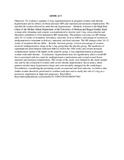| dc.contributor.author | Facchinetti, Fabio | |
| dc.contributor.author | Neri, Isabella | |
| dc.contributor.author | Masellis, Giuseppe | |
| dc.contributor.author | Berardi, Alberto | |
| dc.contributor.author | Sgarbi, Laura | |
| dc.contributor.author | Monari, F | |
| dc.date.accessioned | 2013-06-28T13:54:48Z | |
| dc.date.available | 2013-06-28T13:54:48Z | |
| dc.date.issued | 2010 | |
| dc.identifier.citation | December 2010, Vol. 23, No. 12 , Pages 1456-1460 | en |
| dc.identifier.uri | http://informahealthcare.com/doi/abs/10.3109/14767051003677962 | |
| dc.identifier.uri | http://erepository.uonbi.ac.ke:8080/xmlui/handle/123456789/41872 | |
| dc.description.abstract | Objective. To evaluate l-arginine (l-Arg) supplementation in pregnant women with chronic hypertension and its effects on blood pressure (BP) and maternal and neonatal complications.
Methods. We enrolled 80 women affected by mild chronic hypertension referred to the High Risk Clinic of the Mother–Infant Department of the University of Modena and Reggio Emilia. Each woman after obtaining oral consent was randomized to receive oral l-Arg versus placebo and thereafter submitted to 24-h ambulatory BP monitoring. The primary outcome was BP change after 10–12 weeks of treatment. Secondary outcomes were as follows: percentage of women on antihypertensive treatment at delivery, maternal, and fetal outcome.
Results. The BP changes after 10–12 weeks of treatment did not differ between groups. A lower percentage of women received antihypertensive drugs in the l-Arg group than the placebo group. The incidence of superimposed preeclampsia indicated delivery before the 34th weeks and certain neonatal complications tended to be higher in the placebo group.
Conclusions. l-Arg supplementation in pregnant women with mild chronic hypertension does not significantly affect overall BP but is associated with less need for antihypertensive medications and a trend toward fewer maternal and neonatal complications. The results of the study were limited by the small sample size and by the exclusion of women with severe chronic hypertension. In our policy, these patients needed many hypertensive drugs and were normally managed by the cardiologist. Nevertheless, considering the promising results on maternal and fetal outcome, we believe that further studies should be performed to confirm such data and to clarify the role of l-Arg as a protective supplement in high-risk pregnancy.
Read More: http://informahealthcare.com/doi/abs/10.3109/14767051003677962 | en |
| dc.language.iso | en | en |
| dc.title | l-Arginine supplementation in women with chronic hypertension: impact on blood pressure and maternal and neonatal complications | en |
| dc.type | Article | en |
| local.publisher | College of Physical and Biological Sciences | en |

